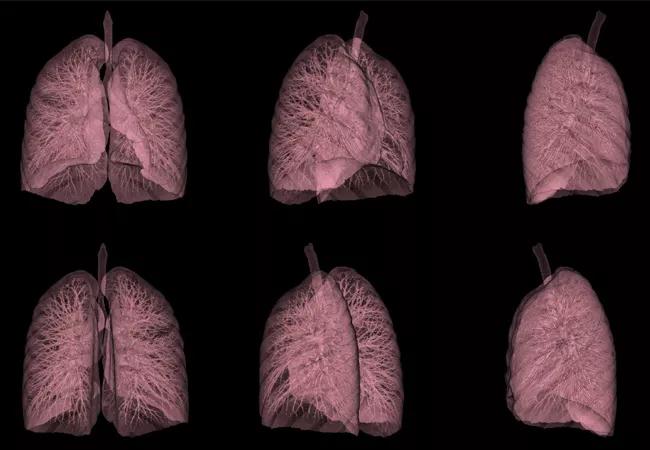Helping patients make value-based decisions

Image content: This image is available to view online.
View image online (https://assets.clevelandclinic.org/transform/cdddc841-5f5e-4765-bbad-1495572498e0/16-PUL-3259-Mazzone-Hero-Image-650x450pxl_jpg)
16-PUL-3259-Mazzone-Hero-Image-650x450pxl
Advertisement
Cleveland Clinic is a non-profit academic medical center. Advertising on our site helps support our mission. We do not endorse non-Cleveland Clinic products or services. Policy
Quality of implementation has significant impact on the overall balance of benefit versus risk in lung cancer screening. One component of a quality program, detailed in the 2015 joint policy statement from the American College of Chest Physicians and American Thoracic Society, is patient and provider education. In recognition of the importance of patient education to effective screening programs, the Center for Medicare and Medicaid Services mandated a counseling and shared decision-making visit for patients referred for screening.
My colleagues and I recently published the first study detailing the impact of this mandated visit on patient understanding and interest in participating and on the program’s patient selection. We showed that a single counseling and shared-decision making visit with a provider increases patient understanding of potential harms and benefits of lung cancer screening.
Beginning in April of 2015, Cleveland Clinic implemented a centralized counseling and shared decision-making visit for patients referred to our lung cancer screening program and confirmed through the medical record to meet eligibility criteria.
An advanced practice provider or physician began the visit with a review of eligibility for screening followed by a narrated educational video developed by our program. We also utilized a decision aid (shouldiscreen.com) for individualized risk assessment and collected data from the patients. Patients were encouraged to ask questions throughout the visit. To measure the impact of these visits, we conducted surveys prior to the visit, immediately afterwards and at one month post-visit. Our previsit in-person and 1-month post visit phone survey included questions about lung cancer benefits and harms, and age and smoking eligibility for screening. The immediate post-visit survey asked additional questions about how the information was presented and whether it was helpful.
Advertisement
Of the 423 patients who had a shared decision-making visit in our study, only 23 did not proceed with low-dose CT (LDCT) screening. Nine of 23 did not meet our criteria, 3 were symptomatic and 11 chose not to proceed after the visit.
Of the patients who completed all three surveys, we saw a significant increase in level of understanding about age and smoking eligibility criteria and in knowledge of the benefits and harms of screening (P = 0.03 – P < 0.0001) regardless of formal education level. Patients also stated that the individualized presentation of risk and benefit made them more comfortable about their decision (mean 3.88 +/- 1.29; 5 = made me more comfortable). By the 1-month follow-up survey, knowledge had decreased but remained above pre-visit levels.
Our results suggest that most patients’ understanding of the benefits and harms of lung cancer screening is inadequate for making value-based decisions. Patients had better knowledge of the benefits of screening than of the risks or eligibility criteria. Cleveland Clinic’s shared decision-making and counseling visit enhanced patient understanding of the benefits and harms of screening, eligibility criteria and helped patients make value-based decisions about screening.
Our findings also suggest a need for referring providers to discuss both harms and benefits of screening, as patients were much more knowledgeable about the benefits of screening than its potential harms. That patient knowledge gained from the visit had diminished by the 1-month follow up underscores the need for a shared decision-making visit prior to each annual screen.
Advertisement
Despite limitations, our study shows that a centralized counseling and shared decision-making visit prior to lung cancer screening can help patients make value-based decisions about their care and ensure a lung cancer screening program is high-quality and patient-centered.
Dr. Mazzone is Director of the Lung Cancer Program for the Respiratory Institute and Director of the Lung Cancer Screening Program.
Advertisement
Advertisement
First-of-its-kind research investigates the viability of standard screening to reduce the burden of late-stage cancer diagnoses
Global R&D efforts expanding first-line and relapse therapy options for patients
Study demonstrates ability to reduce patients’ reliance on phlebotomies to stabilize hematocrit levels
A case study on the value of access to novel therapies through clinical trials
Findings highlight an association between obesity and an increased incidence of moderate-severe disease
Cleveland Clinic Cancer Institute takes multi-faceted approach to increasing clinical trial access 23456
Key learnings from DESTINY trials
Overall survival in patients treated since 2008 is nearly 20% higher than in earlier patients